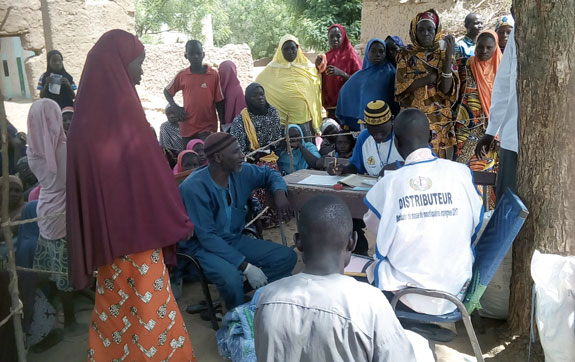
25 Apr Campaign Aims to Stop Malaria across Niger
Joint Effort to Distribute Insecticide Treated Nets Reaches 6.3 Million People
The Republic of Niger, a landlocked West African country located in the Sahel region, is one of the poorest countries in the world, ranking 187 out of 188 countries in the 2016 United Nations Development Programme Human Development Index. Malaria accounts for 28 percent of all illnesses and half of all recorded deaths in the country. Of these deaths, 75 percent are among children under the age of five. Because most of the population lacks access to health facilities, prevention is critical to combat malaria in Niger.
 The National Malaria Control Program (NMCP) and partners, including the USAID HRH2030 program, recognize universal insecticide treated net (ITN) distribution as a key preventive strategy. In June 2017, the team completed Year 3 of a three-year national ITN distribution campaign by distributing nets in the regions of Diffa, Dosso, and Tillabery. HRH2030 Senior Technical Advisor Eric Coulibaly provided critical assistance to the NMCP to forecast and quantify appropriate numbers of nets for the June distribution and worked with stakeholders to design an optimal distribution plan to ensure families received the correct number of nets.
The National Malaria Control Program (NMCP) and partners, including the USAID HRH2030 program, recognize universal insecticide treated net (ITN) distribution as a key preventive strategy. In June 2017, the team completed Year 3 of a three-year national ITN distribution campaign by distributing nets in the regions of Diffa, Dosso, and Tillabery. HRH2030 Senior Technical Advisor Eric Coulibaly provided critical assistance to the NMCP to forecast and quantify appropriate numbers of nets for the June distribution and worked with stakeholders to design an optimal distribution plan to ensure families received the correct number of nets.
This third wave of ITN distribution ensured that 6,300,841 people, including 130,000 refugees, in 1,124,124 households received a bed net. With the completed distribution in these three regions, Niger has achieved universal mass ITN distribution. In the coming year, the HRH2030 senior technical advisor will provide leadership to the NMCP in developing an evaluation protocol and data collection tools to assess the quality and use of the nets delivered during the first two rounds of the universal coverage campaign.
Photo: People gather in Dogondoutchi (Dosso Region), Niger to receive insecticide treated nets.





